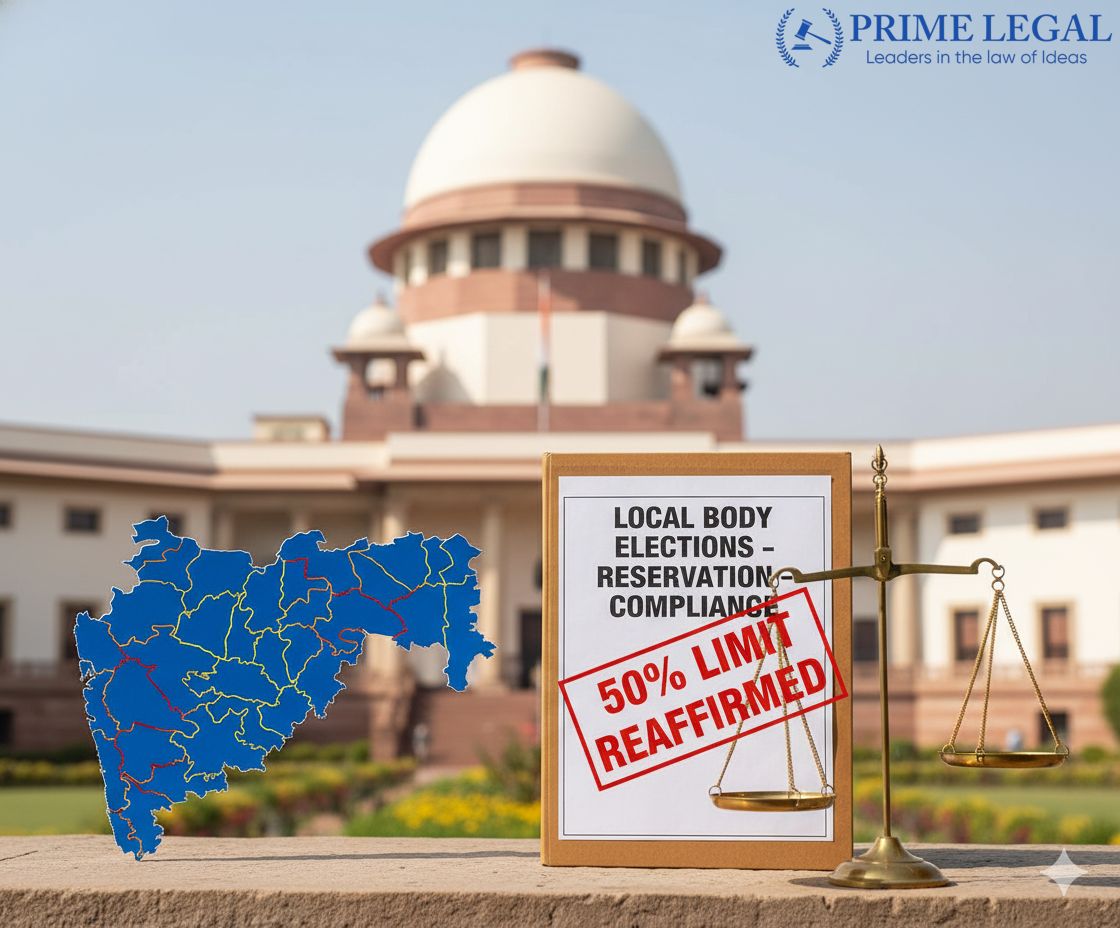INTRODUCTION
Advancing the constitutional mandate on maintaining balance within the system of local self-governance the honorable Supreme Court reiterated that the State cannot breach the judiciary-recognized in Indra Sawhney & ors. V. Union Of India AIR 1993 SC 477, that 50% ceiling on reservations while conducting Maharashtra’s local-body elections. The Court clarified neither the Banthia Commission report nor any administrative process could justify reservations process that could exceed this limit, as doing so would directly violate constitutional norms and binding precedents.
The matter arose from notification issued by several local bodies in Maharashtra implementing the OBC reservation based on Banthia Commissions’ findings (July 7, 2022), which resulted in the total reservation when combining with other categories surpassing 50%. The Court emphasized that its prior directions regarding the “triple test” and the reservation ceiling remained mandatory and that State authorities could not proceed with election process contrary to these constitutional standards.
BACKGROUND
The dispute dates back to Maharashtra’s attempt to reintroduce OBC reservation in local bodies elections after the Supreme Court had earlier struck it down because of non-compliance with the triple-test. In response the State constituted Banthia Commission to carry out the empirical assessment necessary for determining OBC political backwardness. Following the submission of the commission’s report several municipalities issued draft notification assigning OBC reservation percentages that when aggregated with, SC/ST women’s reservation reportedly touched 70%.
This move was strongly objected to as inconsistent with the constitutional reservation framework. The Solicitor General informed the Court that multiple bodies had exceeded the 50% cap promoting the bench to intervene. The Court reiterated that its earlier judgements particularly those governing local body reservation, did not authorize exceeding the constitutionally permissible limit under any circumstances. It was further held that all ongoing nomination process must proceed strictly within the 50% ceiling and no reservation structure contrary to the mandate of Constitution Bench could be allowed to operate.
KEY POINTS
The Court held that the 50% limit on reservation in local-body elections is inviolable, reiterating that its earlier judgements permitted OBC reservation only if the triple-test is fulfilled and the total reservation does not surpass the constitutional ceiling. The Bench stated that any interpretation suggesting that the Court allowed reservations beyond 50% is wholly incorrect.
The Court highlighted that the Banthia Commission report, although submitted, is still under challenge and did not by itself authorize the exceeding the ceiling. The Bench stressed that the pre-Banthia position could operate only within the 50% boundary and that the State could not treat the Commission’s findings as a justification for breaching constitutional limits.
It was further observed that the nomination process for local body elections could continue, but strictly in a manner consistent with the 50% mandate. The Bench warned that if any authority sought to proceed on the premise that the reservation could exceed the ceiling, the Court would not hesitate to stay the entire election process. The judge’s made it clear the administrative convenience or the State’s interpretation of the Commission’s work cannot override constitutional obligations.
RECENT DEVELOPMENTS
The Hon’ble Supreme Court had repeatedly emphasized that reservation in local body elections must remain within constitutional limit and cannot be expanded through executive or legislative measures. In K. Krishna Murthy v. Union of India, (2010) 7 SCC 202, the Supreme Court upheld the constitutionality of reservations for backward classes and women in local self-government bodies. The Court clarified that these reservations form a distinct constitutional category from those in education and employment but must adhere to a triple test.
In the present matter the Court observed that the jurisprudence by rejecting the State’s attempt to justify reservation figures rising beyond the ceiling. The Court also reiterated that the conduct of elections must remain constitutionally compliant at every stage and no local body or administrative authority must disregard the explicit limits imposed by previous Supreme Court findings.
CONCLUSION
The Supreme Court reaffirmed that Maharashtra must adhere to a 50% reservation ceiling and triple-test while conducting local body elections. By restraining the nomination process accordingly, the Court ensured compliance with the constitutional norms is followed. The ruling states that reservation cannot breach established constitutional boundaries, as it strengthens the legal framework safeguarding fairness and integrity in democratic process.
“PRIME LEGAL is a full-service law firm that has won a National Award and has more than 20 years of experience in an array of sectors and practice areas. Prime legal falls into the category of best law firm, best lawyer, best family lawyer, best divorce lawyer, best divorce law firm, best criminal lawyer, best criminal law firm, best consumer lawyer, best civil lawyer.”
WRITTEN BY- SOUMITA CHAKRABORTY


